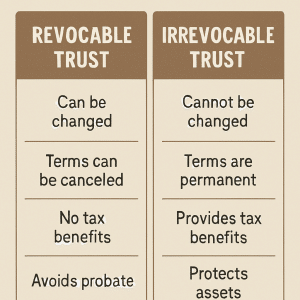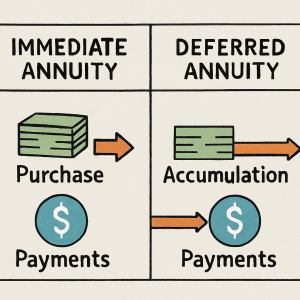Are Annuities a Good Investment for Retirement Today?
You have likely made contributions into a 401(k) or an individual retirement account (IRA) as a way to grow your retirement nest egg. An annuity is another option for retirement savings, but are annuities a good investment for retirement?
Technically an annuity is actually an insurance contract, not an investment. Annuities are retirement savings accounts and as such receive tax-preferred treatment. (¹)
Annuities provide a safe and steady way to grow your retirement savings but their most notable characteristic is the ability to generate a guaranteed lifetime income stream.
Here we’ll cover the pros and cons of positioning part of the fixed income portion of your retirement portfolio into an annuity.
Types of Retirement Annuities
There are many different types of annuities but they can be generally classified into three categories.
Fixed Annuity
A deferred fixed annuity earns a guaranteed interest rate set by the insurer for a specific period of time. For instance, a 5 year fixed annuity with a 3% interest rate would pay the annuity owner 3% for 5 years.
A fixed index annuity (FIA) is a type of fixed annuity that credits interest based on the performance of a market index such as the S&P 500. Fixed Index Annuities offer a chance to earn more interest than a fixed annuity but have the risk of earning zero percent interest in some years.
Visit our Online Fixed Index Annuity Store to compare today’s best fixed index annuity rates.
Variable Annuity
You can lose money in a variable annuity as the annuity value goes up and down based on the performance of the underlying investments. When you purchase a variable annuity you invest directly in stocks, bonds, and mutual funds via “subaccounts”; similar to selecting allocation options inside of a 401(k).
A Registered Index-Linked Annuity (RILA) is a type of variable annuity that is a “hybrid” between an indexed annuity and a variable annuity. A RILA’s upside potential is higher than that of an index annuity, but your funds are still not directly invested in the market.
In exchange for greater upside potential a RILA owner shares in some of the downside risk but not all of it.
Income Annuity
Income annuities are designed to provide a guaranteed income stream rather than a way to grow your retirement savings. A single premium immediate annuity (SPIA) can begin income payments 30 days after your contract is issued. Deferred income annuities begin annuity payments at a future date.
Pros and Cons of Annuities in Retirement
Like all retirement investment vehicles, there are pros and cons to incorporating annuities into an overall retirement income plan.
Seven pros of adding an annuity to a retirement portfolio.
- Owners of annuities are much less concerned than their peers about retirement risks.²
- Annuities accumulate interest tax-deferred.
- They can provide a guaranteed lifetime income payment.
- Higher guaranteed rates than other principal-protected savings options (CD Rates).
- No annual contribution limits; as opposed to an IRA or 401(k).
- Death benefits may avoid probate.
- Index annuities have outperformed bonds during below-median bond environments.
Seven cons of annuities.
- Annuity gains are taxed as ordinary income, not at the lower capital gains rate of most other investments.
- 10% IRS penalty applied to gains for withdrawals made before age 59 and a half.
- Surrender charge fees for early withdrawals greater than the free withdrawal amount.
- Annuity guarantees are not backed by the FDIC, are not NCUA insured, are not bank guaranteed, may lose value, and are not a deposit.
- Some types of annuities (namely the variable type) have high fees.
- Buying an annuity can seem overwhelming and often requires the help of an annuity expert.
- Provide modest returns in comparison to equities.
Annuities Compared to Other Retirement Vehicles
401(k)
If your employer offers a 401(k) retirement account, you are able to save money for retirement through investment products such as stocks, bonds, mutual funds, and exchange-traded funds (ETFs). (5) It’s a very common and simple way for people to save money for retirement over the long term.
An advantage of a 401(k) versus an annuity is that employers often contribute matching funds to your 401(k); employers don’t contribute to annuities. It also makes it easier to save because it comes directly out of your paycheck so you never see the money.
A disadvantage, however, is that annual contributions to a 401(k) are capped, whereas annual contributions to an annuity typically are not capped.
Stock Dividends
Many companies issue shares of stock that pay dividends. One way you can generate annuity-like income from a retirement portfolio is by purchasing stocks that pay dividends.
Many “blue-chip” companies issue stocks with dividend yields of 3%, 4%, 5%, or more. There are simple, broad-market index funds designed to provide dividend yields in the 3-5% range.
If you have a $300,000 stock portfolio with an average dividend yield of 4%, it will generate $12,000 in income each year, or, $1,000 per month.
Financially strong and healthy companies tend to increase dividends over time so theoretically, your income could offer some inflation protection. (Though, of course, dividends are never guaranteed — and investing in individual companies does lean towards the risky side.)
Bonds
Annuities and bonds are both popular ways for investors to generate an income stream and both are considered members of the “fixed income” asset class.
Bonds are more commonly used since they trade like stocks on the markets. Still, many financial experts argue that annuities are a better way to generate income in retirement because the payments last for life.
Famed Economist Roger Ibbotson, and his co-authors, presented the case for annuities as an effective bond alternative during retirement in their 2007 monograph, “Lifetime Financial Advice: Human Capital, Asset Allocation, and Insurance.”³

Fixed Index Annuities: Consider the Alternative
After conducting exhaustive research for his 2018 study, Ibbotson concluded annuities are a good investment for retirement savings not just for income during retirement.
The 20-page report focuses on uncapped Fixed Indexed Annuities; which he says, “if structured properly, can help control financial market risk, mitigate longevity risk, and may outperform bonds over time.” (4)
Recent innovations in annuity product design, combined with an increasingly competitive marketplace, have given individuals preparing for or in retirement powerful and more affordable tools to not only mitigate retirement risks but also to serve as a vehicle to increase wealth leading up to retirement.

Ibbotson along with an impressive team of experts at Zebra Capital Management ran hypothetical return simulations from 1927 to 2016.
Their research found that net of fees, fixed index annuities had an annualized return of 5.81%, compared to 5.32% for long-term government bonds and 9.92% for large-cap stocks over that period (chart with his findings above).
Are Annuities a Good Investment for Retirement?
The Zebra Capital Management Research Team and Roger Ibbotson concluded “Fixed Index Annuities have many attractive features for principal protection, accumulation, and as a potential source of income in retirement.”
“In the simulation, the FIA had a higher net return than long-term government bonds. We showed the FIA had comparable volatility to bonds but with better downside protection. In our study, when bonds underperformed, the FIA performed quite well. It is our view, that annuities are an alternative to consider.”
Annuities are a good investment for retirement if:
- You haven’t retired yet or are early in retirement.
- You have accumulated between $250,000 and $5 million in retirement savings.
- You have average or above-average health.
- You will not need access to the money immediately.
- Certainty in retirement is important to you.
- Worrying about the stock market or your investments makes you anxious.
Annuities aren't a good investment for retirement if:
- Don’t buy an annuity if you are 100% sure you have enough money to last your retirement (no matter how long you live).
- You should not buy an annuity if Social Security and/ or pension benefits cover all of your required retirement living expenses.
- You are seeking a high-risk/high-return investment.
- You shouldn’t buy an annuity if you are still working and not maxing out your 401(k) contributions/ employer match.
- Don’t buy an annuity if you may need access to the money in a lump sum soon.
- You shouldn’t buy an annuity if you have less than $250,000 or more than $5,000,000 saved for retirement.












